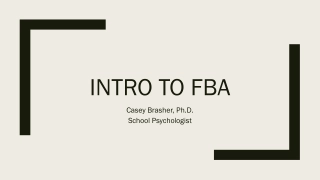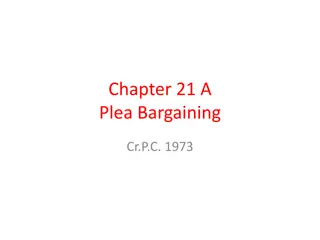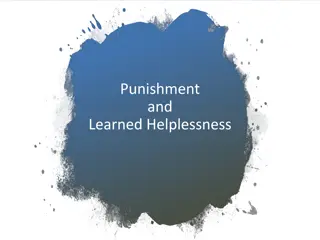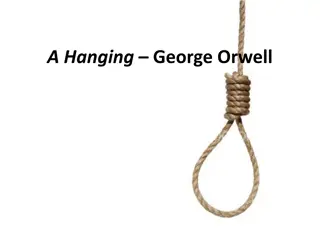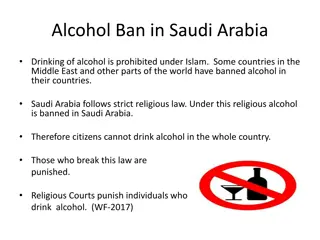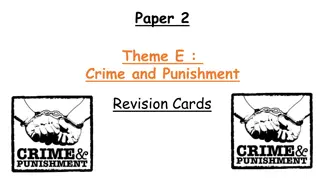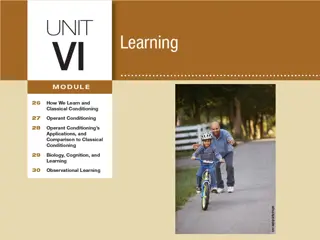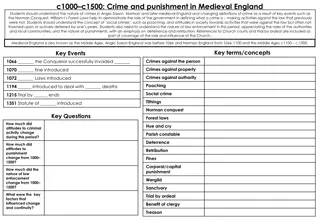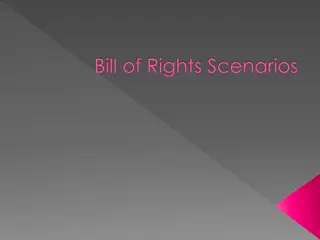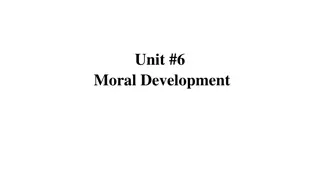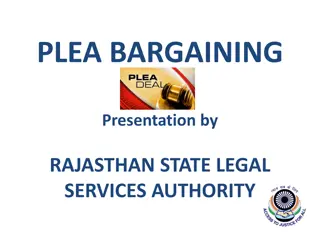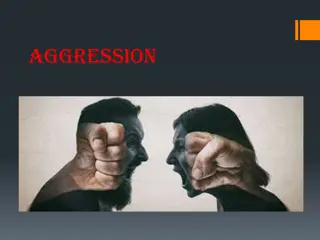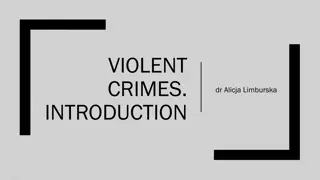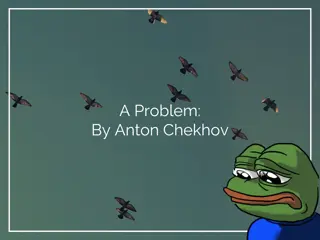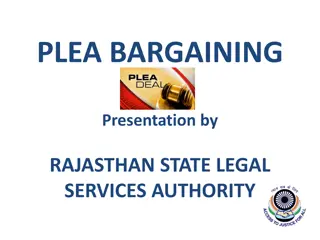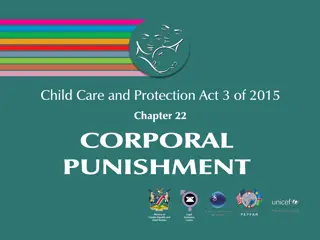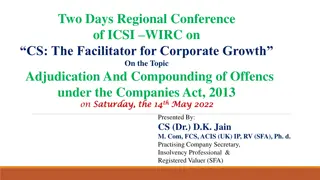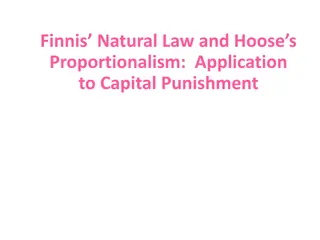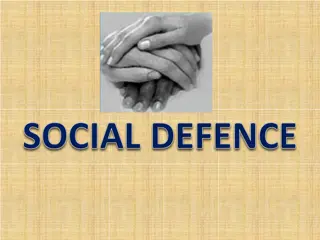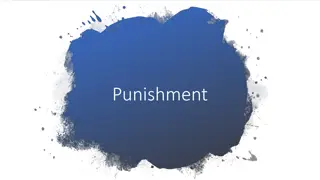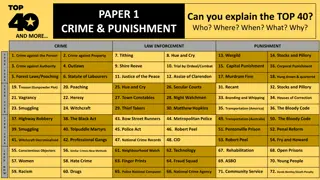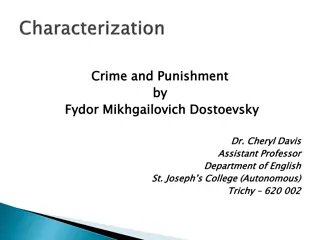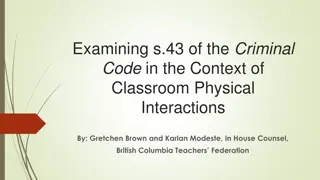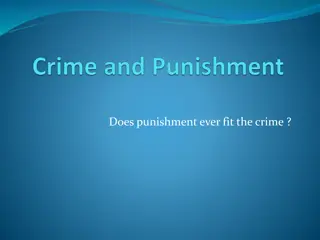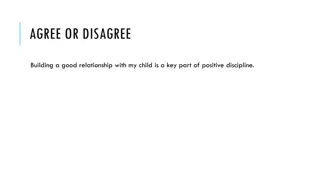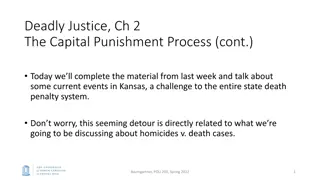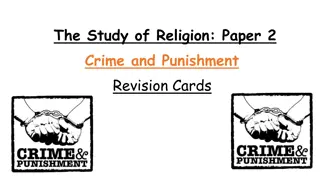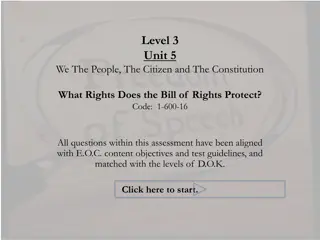INTRO TO FBA
The history of Behaviorism, including the basics of positive and negative reinforcement and punishment. Understand Applied Behavior Analysis (ABA) principles and how behaviors are categorized for ABA.
1 views • 45 slides
INTRO TO FBA
Explore the foundational principles of Applied Behavior Analysis (ABA) through the lens of behaviorism, beginning with B.F. Skinner's theories on observable behavior. Learn about positive reinforcement, negative reinforcement, positive punishment, and negative punishment, and how these concepts shap
4 views • 45 slides
Understanding Plea Bargaining in Criminal Procedure Code, 1973
Plea bargaining, a pre-trial negotiation process where the accused pleads guilty for certain concessions, has a historical background and aims to reduce trial delays and ensure just punishment. Introduced in 2005, Chapter 21A of the Cr.P.C. outlines the concept. It applies to offenses with punishmen
2 views • 21 slides
Understanding Punishment and Learned Helplessness in Behavioral Science
Learning from the consequences that result in pain or discomfort is essential in shaping behavior. Punishment teaches individuals to avoid actions that lead to harm. Different types of punishment, positive and negative, affect behavior differently based on the presence or absence of certain stimuli.
3 views • 48 slides
Reflection on George Orwell's Essay "A Hanging" and Its Context
George Orwell's essay "A Hanging" reflects his experiences as a British police officer in Burma, highlighting social inequalities and his anti-capital punishment sentiments. Through vivid imagery and symbolism, Orwell evokes readers' sympathy for the condemned prisoner, shedding light on the banal r
1 views • 61 slides
Understanding Just Culture in Leadership: Creating a Fair and Error-Preventive Environment
Punitive culture in institutions can lead to mistakes being hidden, affecting error prevention. Dr. Lucian Leape highlights the importance of avoiding punishment for errors, advocating for a Just Culture model. This model, coined by David Marx, recognizes human error and helps differentiate between
0 views • 24 slides
Alcohol Ban in Saudi Arabia: Laws and Punishments
Drinking alcohol is strictly prohibited in Saudi Arabia due to religious laws. The ban extends to making, importing, and selling alcohol, with severe punishments imposed on violators, including expatriates. Reasons for the ban are rooted in Islamic beliefs and the consequences for breaking the law a
0 views • 16 slides
Understanding Crime and Punishment: Insights from Christian and Muslim Perspectives
Exploring the concepts of crime and punishment from Christian and Muslim viewpoints, this text delves into the nature of evil, reasons for criminal behavior, and approaches to sentencing. It highlights the importance of intentions, societal influence, and religious beliefs in guiding actions and con
0 views • 9 slides
Dante's Inferno Canto XIII: The Forest of Suicides
In Canto XIII of Dante's Inferno, Dante and Virgil venture into the Forest of Suicides in the seventh circle of Hell. They encounter sinners who have destroyed their own lives and substances, facing eternal torment. The imagery of twisted trees, Harpies, and relentless punishment paints a vivid pict
0 views • 10 slides
Dante's Inferno Canto 17 Summary and Analysis
Located in the seventh circle of hell, Canto 17 marks the journey's last leg through the sins of violence before descending into the circles reserved for the worst sinners. Dante and Virgil encounter Geryon, a monstrous beast symbolizing fraud. The sinners, usurers, endure eternal torment by sitting
0 views • 6 slides
Understanding and Applying Operant Conditioning Principles
Explore the various applications of operant conditioning in different settings such as school, sports, work, and home. Discover how reinforcement and punishment techniques can be used for self-improvement and stress management. Learn about the key differences between operant and classical conditioni
0 views • 19 slides
Evolution of Crime and Punishment in Medieval and Early Modern England
Explore the evolution of crime and punishment in Medieval and Early Modern England, tracing changes in definitions of crime, law enforcement methods, and societal attitudes. From Norman Forest Laws to the Gunpowder Plot and witch-hunts, discover key events and concepts shaping criminal justice over
0 views • 5 slides
Bill of Rights Violations in Legal Scenarios
Various scenarios depicting violations of constitutional rights in the legal system, such as denial of the right to counsel, jury trials, cruel punishment, and infringements on the right to keep and bear arms through illegal searches. These violations illustrate the importance of upholding constitut
0 views • 26 slides
Understanding Moral Development and Moral Reasoning
Moral development involves an individual's sense of right and wrong, influenced by family, school, friends, and societal environment. Children learn moral concepts from interactions with parents, teachers, peers, and society, shaping their understanding of good and bad. Additionally, moral reasoning
0 views • 13 slides
Understanding Plea Bargaining: Definition, Applicability, and Process
Plea bargaining is a negotiation process between the prosecution and defense, allowing the accused to plead guilty for reduced punishment. It aims to expedite case disposal and lessen court burden. Applicability criteria include offenses with a maximum 7-year sentence, involving women or children un
0 views • 14 slides
Methods of Punishment in Welsh History: Impact and Reflection
Explore the historical developments in crime and punishment in Wales from the 1500s to the present day, focusing on methods of punishment and key figures such as John Howard, Dic Penderyn, Chartist leaders, and the Rebecca Riots. Delve into the impact of John Howard's campaign, the circumstances sur
0 views • 11 slides
Understanding Aggression: Causes and Solutions
Aggression is any intentional behavior aimed at harming others, whether physically, verbally, or emotionally. It can be instrumental or hostile. Biological factors like hormones and neural substrates, social/cultural factors such as frustration and provocation, and environmental/situational factors
0 views • 10 slides
Understanding Criminal Offences: A Comparative Analysis
Exploring the concept of criminal offences, this article delves into the definitions in common law and continental law systems. It discusses the structural elements, harmful nature, prohibition, punishment, and distinctive aspects of criminal acts. A comparison between common law and continental law
1 views • 33 slides
The Rise of Hitler: Establishing the Nazi Police State in Germany
This content chronicles the key events leading to Hitler's rise to power in Germany, focusing on the establishment of the Nazi Police State through propaganda, surveillance, and punishment. It discusses Hitler's use of violence, propaganda, and speeches to solidify his control. The effectiveness and
0 views • 9 slides
A Problem: Analysis of Family Honor and Moral Dilemmas in Anton Chekhov's Work
Explores the moral dilemma faced by the Uskov family when dealing with Sasha's forgery and non-repayment, highlighting the differing views of paternal uncles and the eventual realization of Sasha's criminal tendencies despite the family's attempts to spare him from punishment.
0 views • 19 slides
Exploring John Finnis' Natural Law Theory in Ethics
Delve into the development of John Finnis' Natural Law theory as applied to contemporary ethical issues like immigration and capital punishment. Understand the seven basic human goods, practical reasonableness, and the common good as foundational elements. Evaluate the strengths and weaknesses of Fi
0 views • 12 slides
Understanding Plea Bargaining in Criminal Cases
Plea bargaining is a negotiation process where the accused admits guilt in exchange for a reduced punishment. It helps in resolving cases faster and reducing court congestion. The concept is applicable to cases with a maximum sentence of 7 years, not involving women or children under 14, and not imp
2 views • 14 slides
Understanding the Child Care and Protection Act: Corporal Punishment in Namibia
The Child Care and Protection Act in Namibia prohibits corporal punishment and emphasizes respect for children's rights and dignity. It outlines forms of corporal punishment, constitutional and international frameworks supporting human dignity, and the importance of promoting alternatives to physica
0 views • 19 slides
Crime and Punishment in Anglo-Saxon Times
Life in Anglo-Saxon Britain (410-1066CE) involved small village living, limited urbanization, community policing, and unique forms of justice like trials by ordeal and weregild fines for crimes. The system was decentralized, with neighbors and tithings responsible for law enforcement and punishment
0 views • 8 slides
Conference on Adjudication and Compounding of Offences under Companies Act, 2013
The Two Days Regional Conference of ICSI WIRC focusing on the facilitation of corporate growth through discussions on adjudication and compounding of offences under the Companies Act, 2013. The event, presented by CS (Dr.) D.K. Jain, covers topics like fraud, wrongful gain and loss, punishment for f
0 views • 51 slides
Debate on Capital Punishment: Perspectives and Controversies
Explore the debate surrounding capital punishment, also known as the death penalty. Discover arguments for and against this practice, considerations of human rights, and a look at countries that still allow capital punishment. Reflect on the ethical implications and the value of human life in the co
0 views • 20 slides
Understanding Social Defence in Society
Social defence encompasses the protection, care, and support of marginalized groups through strategic efforts by both the Government and Civil Society. It aims at neutralizing offenders through removal, segregation, or remedial methods, focusing on crime prevention and societal well-being rather tha
0 views • 14 slides
Understanding Punishment in Operant Behavior
Aversive stimuli can influence operant behavior through noncontingent punishment, as seen in conditioned emotional responses like conditioned suppression. The threat of upcoming aversive events can reduce responding, highlighting the importance of conditioned emotional responses. Punishment operates
0 views • 27 slides
Overview of Crime, Law Enforcement, and Punishment Through History
Explore the evolution of crime, law enforcement, and punishment from ancient times to modern eras. From crime against the person to witchcraft laws and the establishment of modern police forces, delve into significant events and practices that shaped law and order systems. The content highlights var
0 views • 5 slides
Character Analysis in "Crime and Punishment" by Fyodor Dostoevsky
Delve into the complex characters of Fyodor Dostoevsky's novel "Crime and Punishment," including the protagonist Raskolnikov, the depraved Svidrigailov, the daughter of Katerina Ivanovna, the painter Nikolai, Raskolnikov's friend Razumikhin, and the junior police official. Explore their inner confli
2 views • 20 slides
Evolution of Punishment: From Brutality to Modern Criminal Justice System
Punishment for crime has evolved over time from brutal public spectacles to more civilized forms of discipline in modern society, reflecting changes in ruling class interests. The Criminal Justice System (CJS) focuses on deterrence, public protection, retribution, and rehabilitation. There has been
1 views • 25 slides
Examining Section 43 of the Criminal Code: The Debate on Corporal Punishment in Schools
Section 43 of the Criminal Code, known as the "Spanking Law," justifies the use of force for correction by teachers, parents, or guardians towards children under their care. This provision has historical roots and has sparked debates on corporal punishment in schools globally. The article explores t
2 views • 43 slides
Reflections on Punishment and Justice: A Philosophical Inquiry
Delving into the intersection of punishment, morality, and justice, this thought-provoking exploration questions the concept of proportionate punishment for crimes committed. It challenges conventional notions of retributive justice and poses ethical dilemmas related to the effectiveness of the crim
0 views • 8 slides
The Debate Over Lethal Injections in Capital Punishment
Lethal injections have become a controversial method of capital punishment, with the debate focusing on their legality, ethics, and effectiveness. Over the years, the drugs used in lethal injections have changed due to drug shortages, leading to concerns about botched executions and prolonged suffer
0 views • 12 slides
Positive Discipline Strategies for Building a Strong Parent-Child Relationship
Developing a positive relationship with your child is crucial for effective discipline. It involves catching them being good, setting clear expectations, childproofing the environment, and using positive reinforcement rather than physical punishment. Understanding the difference between discipline a
0 views • 22 slides
Exploring Crime and Punishment: The Stanley Tookie Williams Case Study
Dive into the topic of crime and punishment through the compelling case study of Stanley Tookie Williams, co-founder of the Los Angeles Crips gang. Analyze the controversial use of the death penalty, explore the concept of rehabilitation on death row, and consider the complexities of justice and mer
0 views • 12 slides
The Capital Punishment Process: Aggravators, Mitigators, and Post-Conviction Appeals
The continuation of the discussion on the capital punishment process, specifically focusing on the bifurcated trial, the consideration of aggravators and mitigators, post-conviction appeals including direct appeal and Habeas Corpus appeals, and the importance of proportionality review in state supre
0 views • 25 slides
Exploring Crime and Punishment in Religion: Key Insights and Perspectives
Delve into the study of crime and punishment within the framework of religion, examining perspectives from Christianity and Islam. Understand the concept of evil, the reasons behind criminal behavior, and the nuances of sentencing based on religious beliefs. Explore how mental illness, poverty, upbr
0 views • 9 slides
Understanding Rights and Protections in the Constitution
Explore key concepts related to the Bill of Rights, including definitions of capital punishment, cruel and unusual punishment, and double jeopardy. Test your knowledge on constitutional rights and legal principles in this interactive assessment.
0 views • 77 slides
Understanding the Aims of Punishment and Evaluating Deterrence as an Effective Aim
Explore the aims of punishment and the reasons behind punishing criminals in different ways through a series of tasks. Match descriptions to aims, identify and explain key aims of punishment, and evaluate the effectiveness of deterrence as a primary aim. Provide reasoned arguments, consider religiou
0 views • 4 slides
